Language
- Deutsch
- English
- Español
- Français
- Italiano
- Nederlands
- Português
Currency
- AUD Australian Dollar
- CAD Canadian Dollar
- EUR Euro
- GBP Pound Sterling
- SGD Singapore Dollar
- USD US Dollar
- ZAR Rand

Each day on safari in Africa is a magical experience, whether you're exploring the savanna on foot or in a 4×4 vehicle in search of the Big 5, taking to the sky in a hot-air balloon to witness the Great Wildebeest Migration, or hiking through the thick rainforests of Uganda or Rwanda on a gorilla trek. Every single day is steeped in the promise of a unique adventure and cherished memories.
Although each day is unpredictable to a certain extent, based on the time of year or location, there is a general format or schedule that safaris tend to follow but, as a rule, safari does follow a familiar rhythm that combines thrilling game viewing with ample time to relax in between – a dream vacation in anyone's book. One rule of thumb is that there are usually two game drives a day – one in the early morning and late afternoon when animals are at their most active.
If you want a more detailed look at what your schedule might be, we put together a guide that takes a deep dive into what to expect on a typical day on safari in Africa, when staying at a traditional lodge or camps that offers game drives in a national park, private concession or conservancy.

Depending on what time the sun rises, staff will wake you up in time for the morning game drive. If you are not a morning person, it might help that they usually arrive with a knock at the door and a tray of very welcome tea, coffee and cookies. Generally, they confirm the time and your order the night before dinner.
No matter your location, it's always cool to cold in the early hours. It doesn't help that you'll be in an open safari vehicle for hours! So, you'll want to dress warm and in layers to stave off the chill. It helps to lay out your clothes the night before so you don't waste time getting dressed in the morning – you won't want to miss a second of the early morning action!
If you're wondering why early morning game drives are held at an ungodly hour, it's because this is when the most activity occurs. Many animals (especially predators) graze or hunt before the sun rises. It gets very hot in the savanna – too hot for animals to do anything other than find a shady spot to laze. So, they tend to seek out food while it's still cool.
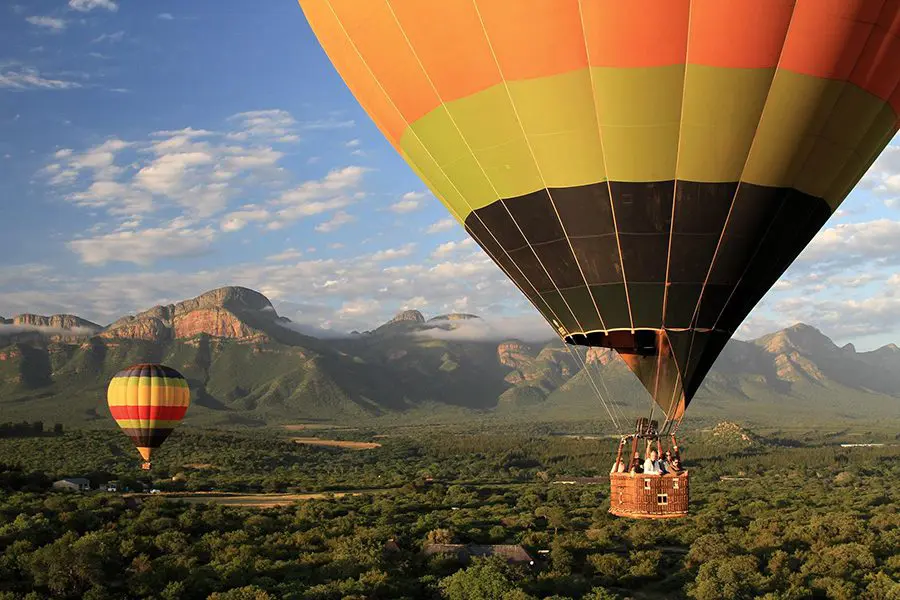
Although you may set out before the first light, there is something magical about being out in nature as the moon sets and the sun comes up. The dawn chorus of birds is wonderful in Africa, and this is a great time to see nocturnal hunters like lions and leopards bedding down for the day or, in the case of lions, finishing off the last of their kill (leopards will stash theirs in a tree).
Animals like elephants, gazelle, antelope, buffalo and giraffes will all start moving to waterholes to quench their thirst. Their reflections in the water in the soft morning light make for beautiful photos. Wild dogs will try to make a kill now before it gets too hot and exhausting to chase down prey in the heat.
Your guide will generally serve coffee, tea and more cookies during a refreshment break during your drive.
If you are going hot-air ballooning (mostly in Namibia, Kenya or Tanzania), you will also have to get up early as dawn provides the best conditions (winds are usually at their lowest in the morning).
In private concessions and conservancies, you can head out at any time; in national parks and reserves, you will have to wait for the gates to open.
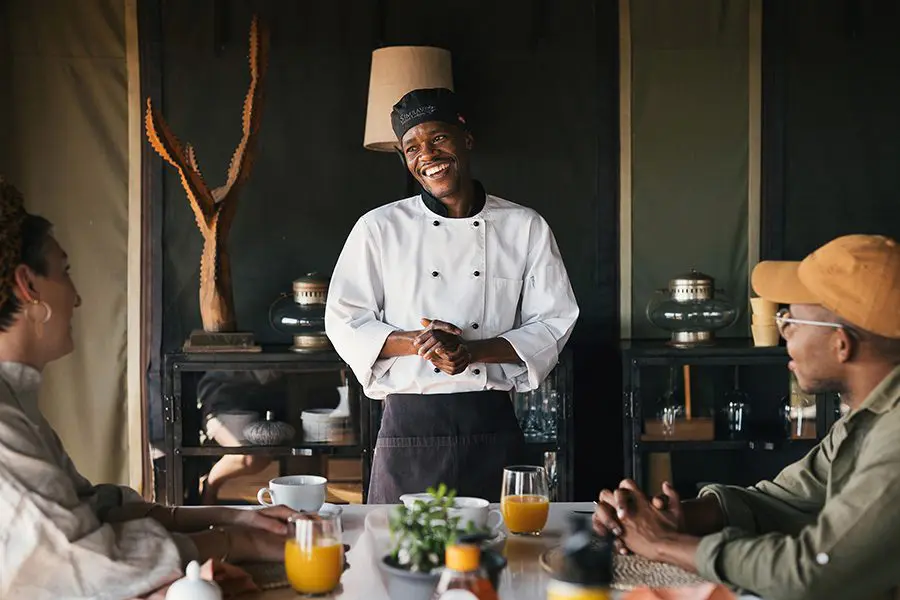
By mid-morning it will be too hot to be out (especially in South Africa where game-drive vehicles generally don't have roofs) and the animals, having quenched their thirst, will be retreating to shade and will be hard to see and photograph in the dappled light.
You will return to the lodge for breakfast or brunch, depending on how late it is and whether you had a cooked bush breakfast. The latter is often laid on for special occasions or after hot-air ballooning. It's traditional after a hot-air balloon safari to drink a glass of champagne – go for it if you like, you're on vacation after all!
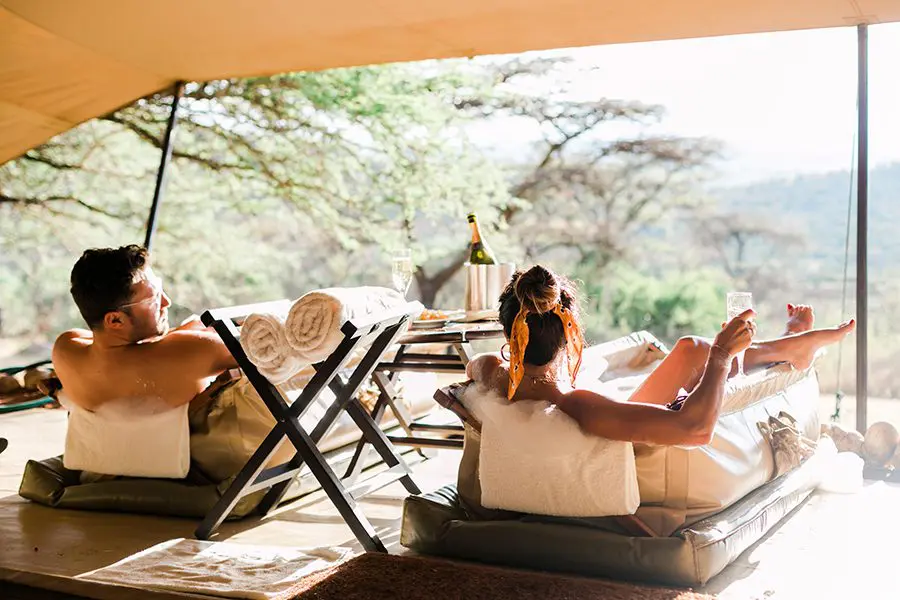
After breakfast or lunch, do as you please. Free time between activities can be spent enjoying all the lodge or camp has to offer. Take a book down to the pool, go for a massage or pedicure, hit the gym or – quite frankly – take a nap. What you do will depend on the lodge's facilities so if you like having lots of choices, ask your Africa Safari Expert to recommend accommodation with a spa, gym, pool, library, media centre, Wi-Fi, guided walking trails, kids' clubs and so forth. Please note though, that not all camps have these elements.
If you are active and the lodge or camp offers it, enquire the night before about taking a guided nature walk during this time (if it is very hot, some guides prefer to do it instead of the morning drive). You will need closed shoes and preferably long trousers, and the focus will be on the little aspects of Africa that often get overlooked on a vehicle: how the wind ‘whistles' through a whistling acacia tree, how dung beetles know which direction they're going, how termites build those massive mounds and how yellow weaver birds craft such intricate nests.
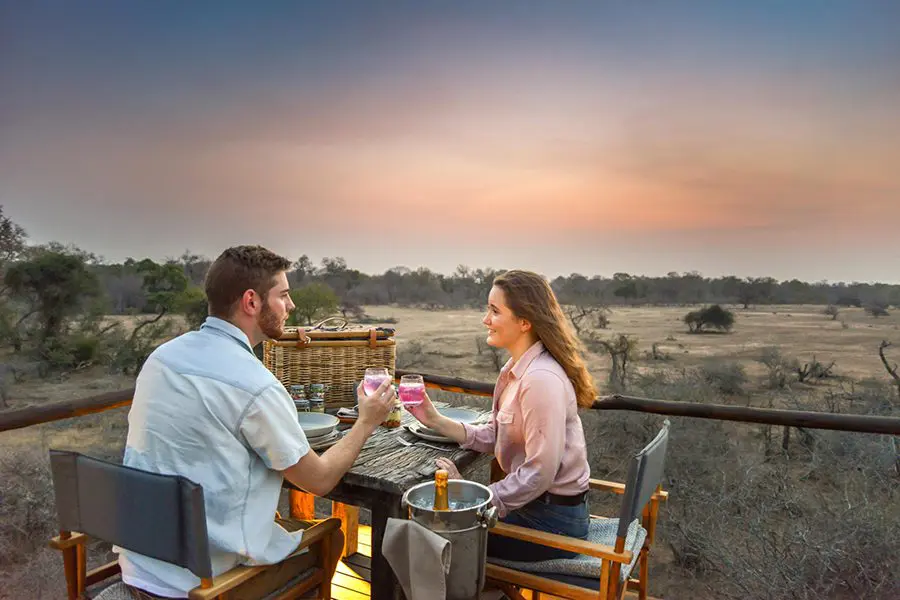
If you had an early breakfast, midday is the time for lunch. If you had a late brunch, then many camps will forgo lunch – clients often say they put on a few pounds during their vacation because of all the delicious kinds of food served on safari!
After lunch, a nap is hard to beat, as are a few laps in the pool or catching up with editing your photos. Lots of safari goers take the time to read up on the habits and behaviour of the animals they saw on their morning drive.

At about 3pm, start to get ready for your afternoon game drive – gather your binoculars, refill your water bottle, put in your drinks order for sundowners and, if it's winter, be sure to take your scarf, gloves and beanie – it will get chilly once the sun goes down.
High tea is a venerable safari tradition that harks back to the unhurried days of the 19th century. Depending on the camp, you will nibble anything from chocolate cake and scones served with cream to tiny savoury sandwiches and petit fours. Even if you aren't hungry, do munch a few things – dinner is a long way off and you don't want to get hungry on the game drive. Refreshments will, of course, also be served on the evening game drive at a lookout spot.
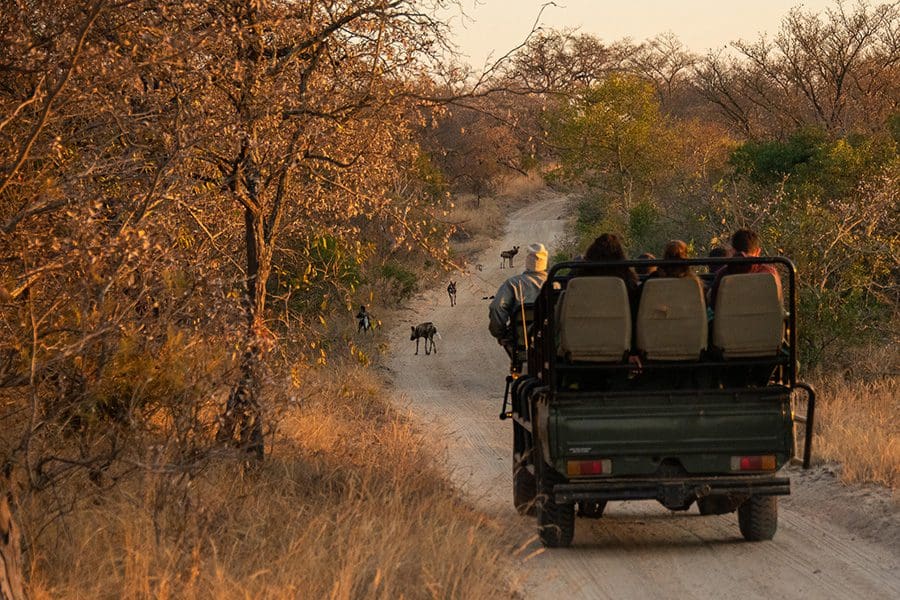
It is finally cool enough for the animals to become active again: slowly they emerge to drink at waterholes, and lions that have strayed away from the pride will start contact calling to find each other again for another night of hunting.
A major safari tradition is ‘sundowners' – drinks and snacks enjoyed halfway through the afternoon drive at a scenic spot or lookout. The closer to the equator you are, the shorter the sunset will be, so have your camera ready.
If you are in a private concession or conservancy, you will be able to stay out after dark and use a spotlight to look for nocturnal animals on the drive back to camp. Those in national parks will have to be out of the park by dusk when the gates close for the night.
Remember that mosquitoes are most active at night so wear long trousers and sleeves and use an eco-friendly repellent. They are attracted to black and blue so avoid these colours in the evening (or don't even bother packing them – greens, greys and browns are always best).
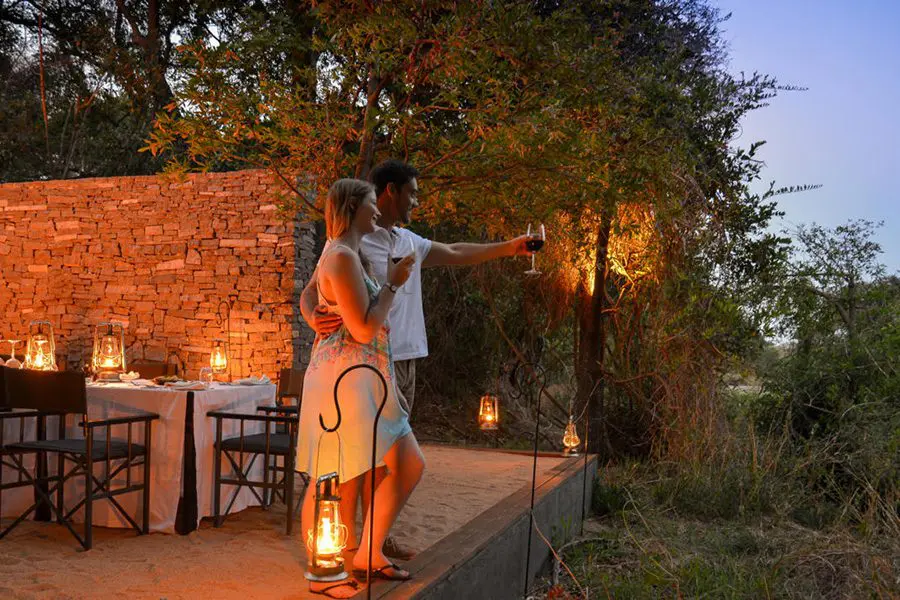
You may not think you are hungry but there is something about being out in the fresh air that stokes the appetite. Depending on your accommodation, dinner may be a buffet, plated or á la carte but is generally a multi-course affair accompanied by wine. If the night is clear, it may be served in the boma, which is a traditional open-air area around a warm campfire. The staff often sing, dance and drum in the boma before dinner – if they call you up, just go with it! When next will you be singing and dancing under the Milky Way in Africa?
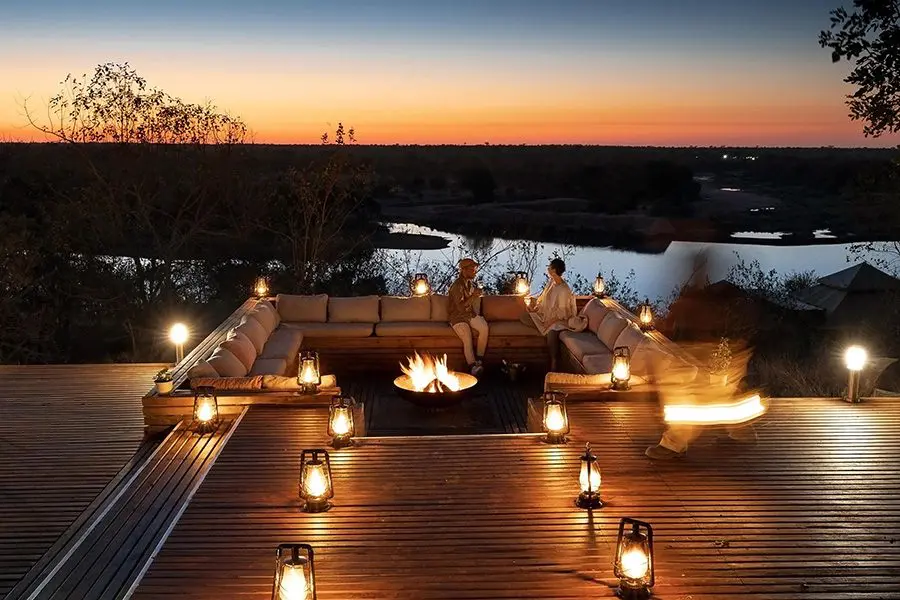
A day on safari in Africa usually ends around 9pm. With such an early wake-up call, most people head to bed after dinner. Some camps may offer stargazing with a telescope or a lecture by a specialist guide or researcher but most just allow you to enjoy the peace and quiet of the African night (except for those whooping hyenas and chortling hippos in the distance).
For many people, one of the best things about safari is that you don't really need to make many decisions. Unlike in a city where you have to decide when to eat, where to eat, where to go and what to do, safari has a built-in rhythm that is very relaxing and, if we do say, totally addictive. The combination of early mornings, great food, fresh air and a good night's sleep is food for the soul.
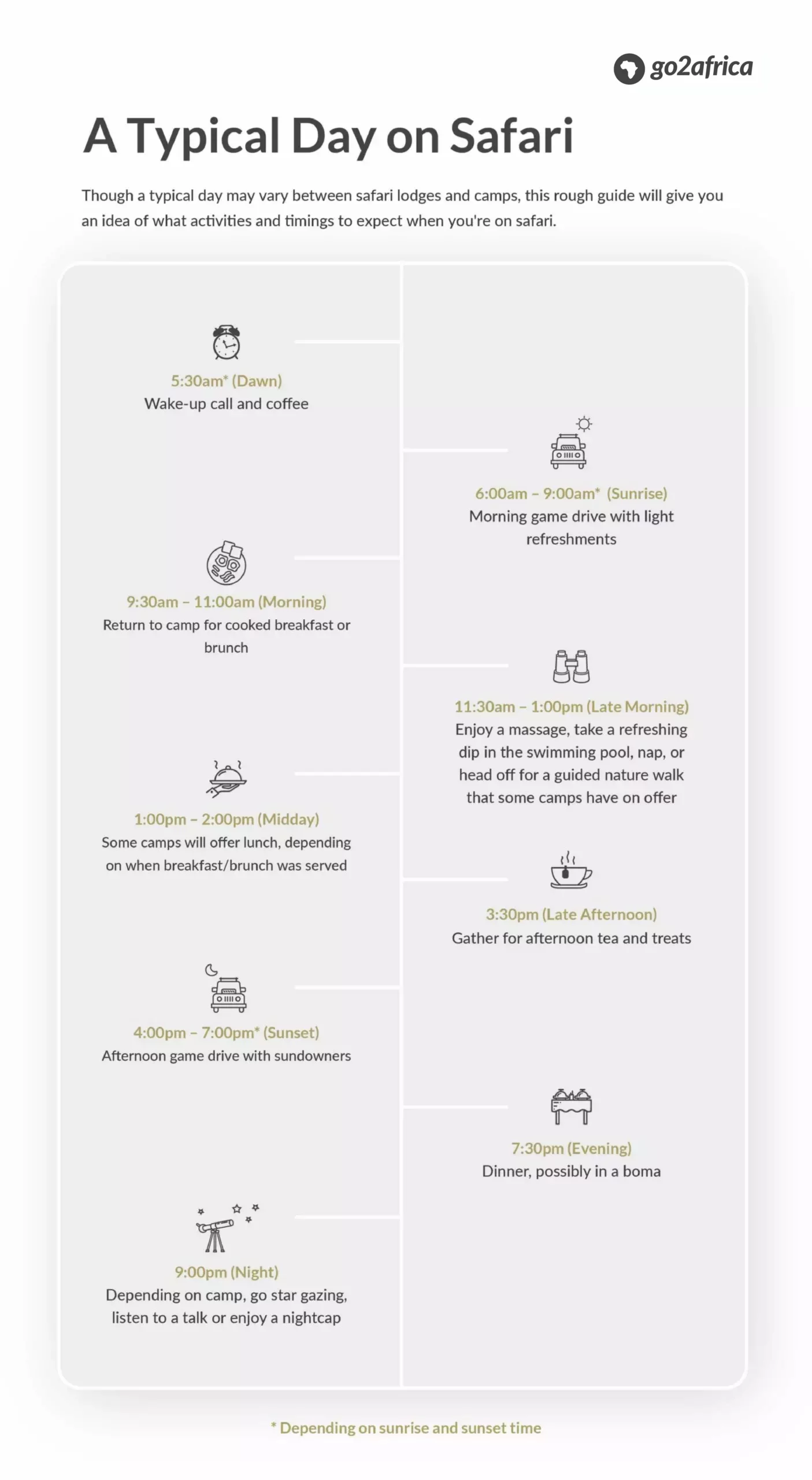
Derived from the Swahili word for ‘journey', the term safari refers to an adventure or expedition into the African wilderness, where you'll have the opportunity to encounter and experience wildlife and untamed nature safely and respectfully.
From morning and afternoon safari drives right up to dinner on safari, the above guide covers all the basics you need to know for what to expect on a typical day on safari in Africa. If you have more questions, your Africa Safari Expert will be able to provide you with more in-depth information.
One of the most magical aspects of safaris is that each day will yield a wealth of knowledge for you. From learning about the behaviour of each animal you see and gaining a deeper understanding of the diverse ecosystem around you to picking up new skills from traditional tribespeople in the local villages. But if you'd like to get a head-start on your African safari education, why not try practising a few phrases from our safari glossary that covers the most commonly used lingo out in the bush?
In addition to thrilling game drives that take you on a search for all your favourite African wildlife, there are many other activities and experiences you can enjoy on safari. These include gorilla trekking, walking safaris, hikes, quad biking (ATV) tours, cycling tours, horseback safaris, hot-air balloon trips, boating excursions, cultural experiences, leisure activities (like swimming, spa treatments or workouts in the gym) and many other endeavours. It all depends on the destination you choose and how you wish to tailor-make your own safari.
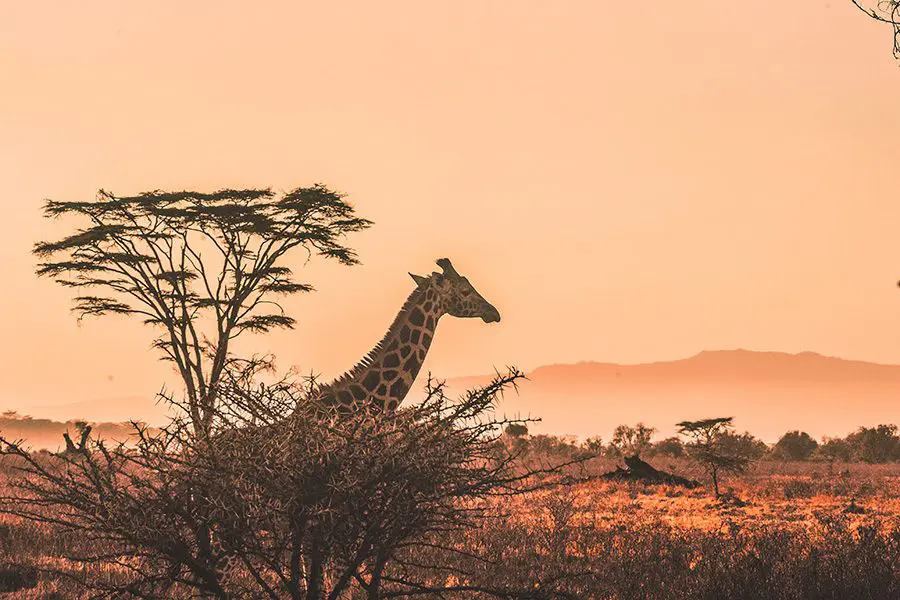
The only way to relieve yourself while out on a game drive is by making use of the “bush toilet”. Fortunately, your guide will be an expert in knowing the best spots to do this and will have toilet paper on hand. That being said, you should always use the toilet at the lodge before leaving for your game drive. Be sure to read up on Africa travel tips to make sure you're fully prepared for any situation.
Most (if not all) camps and lodges offer two (2) game drives per day. The first happens in the early morning and the second in the late afternoon. If you are staying at an accommodation in a private conservancy, you'll have the opportunity to enjoy night drives, where you seek out nocturnal animals with the help of a spotlight.
Early mornings and late afternoons are considered the best times to enjoy a game drive in a national park or private conservancy. Animals are at their most active during these times, either heading out to graze or quench their thirst at a waterhole or, if you're a predator, hunting down prey for your next meal.
The best safaris in Africa are priceless! Although there's no definitive answer to this, as each traveller's itinerary will differ from the next, we do have a guide that covers this topic in more detail: How Much Are African Safaris?
Get in touch with our team of Africa Safari Experts to start planning your adventure to experience a typical day on safari for yourself. With over two decades of experience and knowledge, we are professionals in crafting tailor-made itineraries that are sure to be the trip of your dreams.